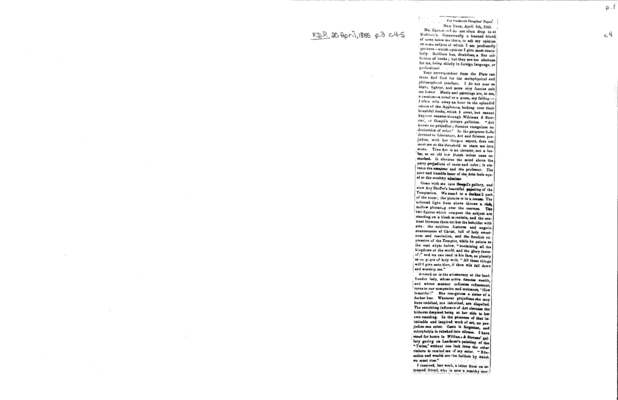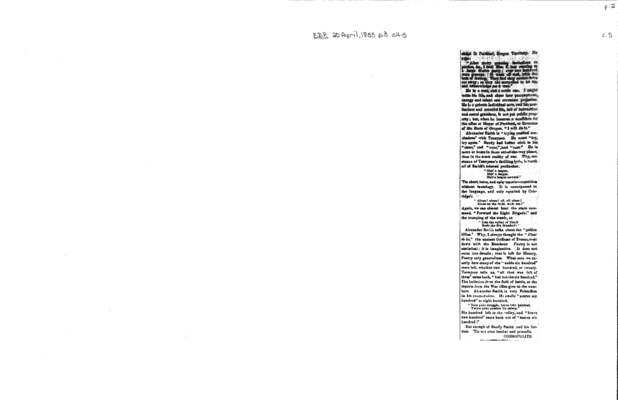Pages
D6764_Page_1
For Frederick Douglass' Paper
New York, April 4th, 1855
Mr. Editor: --I do not often drop in at Builliere's. Occasionally a learned friend of mine takes me there, to ask my opinion on some subject of which I am profoundly ignorant -- which opinion I give mose oraculary. Bailliere has, doubtless, a fine collection of books; but they are too abstruse for me, being chiefly in foreign language, or professional.
Your correspondent from the Flats can there find food for his metaphysical and philosophical intellect. I do not soar so high; lighter, and more airy fancies suit me better. Music and paintings are, to me, a passion -- a novel or a poem, my failing -- I often wile away an hour in the splendid saloon of the Appletons, looking over their beautiful books, which I covet, but cannot buy - or saunter through Williams & Stevens, or Goupil's picture galleries. "Art knows no prejudice; Science recognizes no distinction of color." In the gorgeous halls devoted to Literature, Art and Science, prejudice, with her Gorgon aspect, does not meet me at the threshold to stare me into stone. True Art is an elevator, not a levler, as an old low Dutch writer once remarked. It elevates the mind above the petty prejudices of caste and color; it elevates the amateur and the professor. The poor and humble lover of the Arts feels equal to the wealthy admirer.
Come with me into Gospil's gallery, and view Ary Sheffer's beautiful painting of the Temptation. We stand in a darken'd part of the room; the picture is in a recess. The softened light from above throws a rich, mellow glooming over the canvass. The two figures which compose the subject are standing on a bleak mountain, and the contrast between them strikes the beholder with awe: the sublime features and angelic countenance of Christ, full of holy sweetness and resolution, and the fiendish expession of the Tempter, while he pointes to the vast abyss below, "containing all the kingdoms of the world, and the glory thereof; " and we can read in his face, as plainly as on pages of holy writ, "All these things will I give unto thee, if thou wilt fall down and worship me."
Around us is the aristocracy of the land, Yonder lady, whose attire denotes wealth, and whose manner indicates refinement, turns to our companion and murmurs, "How beautiful!" She recognizes a sister of a darker hue. Whatever prejudices she may have imbibed, not inherited, are dispelled. The snobbling influence of Art elevates the hitherto despised being at her side to her own standing. In the presence of that inimitable and inspired work of art, no prejudice can enter. Caste is forgotten, and colorphobia is rebuked into silence. I have stood for hours in Williams & Stevens' gallery gazing on Landsoer's painting of the "Twins," without one look from the other visitors to remind me of my color. "Education and wealth are the ladders by which we must rise."
I received, last week, a letter from an esteemed friend, who is now a wealthy merchant
D6764_Page_2
in Portland, Oregon Territory. He says:
"After many pressing invitations to parties, &c, I took [illegible). Last evening to a large dinner party; over two hundred were present. It went off well, with the best of feeling. They fed them [illegible] drive me away; so they are compelled to let up, and acknowledge me a man."
He is a man, and a noble one. I might write his life, and show how perseverence, energy and talent can overcome prejudice. He is a private individual now, and his [illegible] and eventful life, full of instruction and moral grandeur, is not yet public property; but, when he becomes a candidate for the office of Mayor of Portland, or Governor of the State of Oregon, "I will do it."
Alexander Smith is "trying poetical [illegible]" with Tennyson. He must "try, try again." Sany had better stick to his "stars," and "suns," and "seas," He is more at home in those out-of-the-way places, then in the stern reality of war. Why, one stanza of Tennyson's thrilling lyric, is worth all of Smith's labored production.
"Half a league, Half a league, Half a league onward."
Tis short, terse and epigramatic - repetition without (tautology). It is unsurpassed in the language, and only equalled by Coleridge's
"Alone! alone! all, all alone! Alone on the wide, wide sea!"
Again, we can almost hear the stern command, "Forward the Light Brigade!' and the tramping of the steeds, as
"Into the valley of Death Rode the Six Hundred!"
Alexander Smith talks about the "golden lillies." Why, I always thought the "Fleur de lis," th ancient Oriflame of France, went down with the Bourbons. Poetry is not statistical; it is imaginative. It does not enter into details; that is left for History. Poetry only generalizes. What care we exactly how many of the "noble six hundred" were left, whether two hundred, or twenty. Tennyson tells us, "all that was left of them" came back, "but not the six hundred." The bulletins from the field of battle, or the reports from the War office give us the numbers. Alexander Smith is very Falstaffian in his enumeration. He swells "scarce six hundred" to eight hundred.
"Vain your struggle, brave two hundred, Twice your number lie asleep."
Six hundred left in the valley, and "brave two hundred" came back out of the "scarce six hundred!"
But enough of Sandy Smith and his fustian. "Tis not even leather and prunella.["]
COSMOPOLITE

